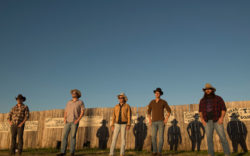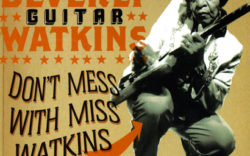Before the string of current acts that made Athens a heavy rock hotbed came Cinemechanica, a mid-aughts math rock and post-rock band skilled at the sort of tension that inspires more clenched fists than swiveling hips. Ten years after its first album, The Martial Arts, helped dictate the shape of noise-rock to come, the band is back in full force with a new album that fits in the local music landscape so well it sounds more like a natural progression of Athens rock than a nostalgic rebirth.
Cinemechanica is a patient zero of sorts for the current rock scene, as it’s likely the first band on the minds of members of Lazer/Wulf, Vincas and Motherfucker when they sing the praises of their musical forerunners.
“I’m sort of an outsider in the Cinemechanica camp, because I’ve been a fan for way longer than I’ve been in the band, so I’ve always been of the opinion that no one really sounds like Cinemechanica, and if they come close, it’s because they are fans of Cinemechanica,” says Bryan Aiken, Cinemechanica’s new singer and guitarist and an established force locally as a member of Lazer/Wulf. “They started that thing in Athens—being math rock, but not doing dance music, and being tough.”
For Aiken, who’s also the graphic designer responsible for the new album’s artwork, filling the role Jordan Olivera (formerly of Manray) plays on the album brings his local experience full circle.
“Cinemechanica is also what brought me to Athens 15 years ago,” he says. “I was coming out of high school, and I was going to be an idiot and go to West Georgia. Some friends brought me to Athens for the first time, and I saw Maserati, We Versus the Shark and Cinemechanica play. I lost my mind and said, ‘I want to do this with my life. Why do I want to go to West Georgia and pursue this other career, when that’s not where my heart is?’ So I nixed that, moved to Athens and started a band.”
If Cinemechanica played such a role in artists like Aiken not only strapping on guitars but playing them at full volume with an array of pedals, then why the radio silence, album-wise, over the past decade?
“We never really stopped working on music,” says bassist Joel Hatstat. “Things just got in the way. I left the band in 2007 and started a recording studio. They kept going and made the Rivals EP, which came out in 2008. After a couple of years, they needed a bass player, so I rejoined and we started writing new songs again. And then in 2010, Andy [Pruett], who was our old singer and guitar player, left the band to go to grad school.
“In the meantime, we had a lot of other bands going on,” he continues. “Mike [Albanese], our drummer, joined Maserati; the Bit Brigade thing really took off for the guys; they had Powers going on; and even now there’s still Double Ferrari happening. Basically, there was just a lot going on.”
Picking up where he left off in 2006 when it came time to record was natural for Hatstat, after years of playing in bands with Albanese and guitarist Bryant Williamson. “That music is what happens when me, Mike and Bryant are in a room together,” he says. “That’s just how it’s always been. It touches on all the music we grew up listening to together. I’ve been playing music with Mike since 1993, and I’ve been playing music with Bryant since 1999. It’s all just a reflection of what we listen to.”
Like his new bandmate Aiken, Hatstat first came to Athens because of Cinemechanica, four years before The Martial Arts etched the band into Athens music history. “I moved here with Mike from New Jersey to do Cinemechanica in 2002 because Andy was going to finish his college degree at UGA,” he says.
According to Hatstat, the group’s members’ other projects, which at times have taken time and attention away from Cinemechanica, leave an audible mark on the new album. “The guitar playing in Bit Brigade has certainly influenced the guitar playing in Cinemechanica, and a lot of the trade-off stuff that happened in Powers with the four guitars has certainly surfaced in Cinemechanica,” he says.
Other bands with Cinemechanica ties have also helped set the stage for the group’s most extensive tour since 2010. Aiken played many of the same venues this year with Lazer/Wulf, placing a familiar face front-and-center most nights. “In a lot of ways, a lot of these other bands have been doing legwork for us,” Aiken says. “We can say it’s Cinemechanica featuring members of some of the bands that formed after Cinemechanica started. It’s sort of backwards how that works.”
For Aiken, taking an all-time favorite band’s music to familiar tour stops is a mission he accepts with evangelistic zeal. “When I first heard this record two years ago when they were recording it, I felt so deeply in love, but I couldn’t share it with people,” he says. “Now I get to go on tour and share this music that I love—but didn’t create—with people.”
Although Aiken joined the band after the album was recorded, Hatstat adds a quick aside that should excite fans unwilling to wait another decade for a third album. “Going forward, I imagine that Bryan is going to be a big part of the creation of new stuff,” he says.
Regardless of Cinemechanica’s future, the current lineup finds itself reaping the rewards of a regional noise-rock presence it pioneered years ago. It’s back at the forefront of a scene that’s reached a new zenith under the watch of bands that have followed their leader’s winding path.
Like what you just read? Support Flagpole by making a donation today. Every dollar you give helps fund our ongoing mission to provide Athens with quality, independent journalism.









